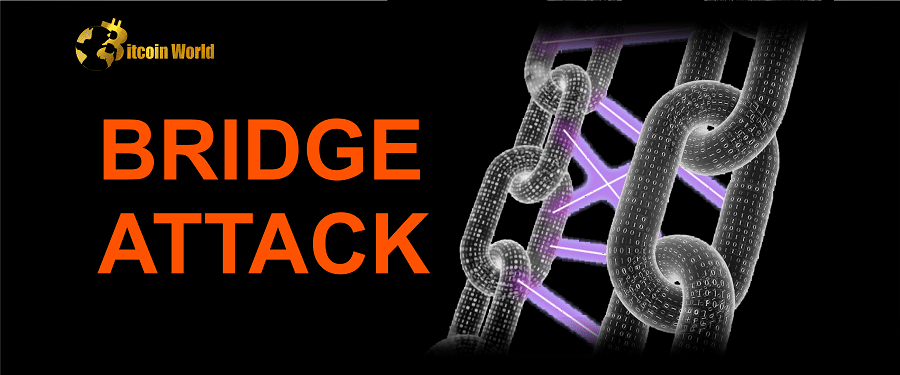Imagine a world where different blockchains communicate seamlessly, allowing you to move your crypto assets effortlessly between them. That’s the promise of cross-chain bridges. But this innovative technology has a dark side: a massive wave of hacks costing users billions. Over the past two years alone, a staggering $2.5 billion has been stolen from these bridges. Are your crypto assets at risk? Let’s dive into why cross-chain bridges are prime targets for hackers and what solutions are emerging to secure the future of decentralized finance (DeFi).
The Billion-Dollar Bridge Problem: Why Are Cross-Chain Bridges Under Attack?
Decentralized Finance (DeFi) is constantly evolving, aiming for a more connected and user-friendly crypto ecosystem. Cross-chain bridges are crucial for this evolution, acting as vital links between different blockchains. Think of them as digital bridges connecting isolated islands, allowing assets and data to flow freely. However, this crucial infrastructure has become a major pain point in terms of security.
Data from Token Terminal reveals the alarming scale of the problem: more than $2.5 billion vanished between 2020 and 2022 due to exploits targeting cross-chain bridges. This dwarfs many other types of security breaches in the crypto space, highlighting a critical vulnerability.
Experts point to an inherent design flaw in bridges as the root cause. Theo Gauthier, founder and CEO of Toposware, explains that regardless of individual bridge security measures, the fundamental issue lies in their dependence on the security of the connected blockchains. Essentially, a bridge is only as strong as its weakest link. If one of the linked chains has a vulnerability, the entire bridge becomes susceptible to attack.
Why are Bridges Vulnerable? Understanding the Core Issues
To grasp the vulnerability, we need to understand the purpose of bridges. In essence, they solve the problem of blockchain silos. Blockchains, by nature, operate independently. Bridges are designed to:
- Enable Interoperability: They facilitate communication and data transfer between different blockchains that would otherwise be isolated.
- Improve User Experience: By connecting chains, bridges aim to create a smoother, more integrated user experience across the crypto landscape.
- Promote Crypto Adoption: Seamless interoperability is seen as key to wider crypto adoption, making it easier for users to access different ecosystems and applications.
However, this very mechanism of connecting disparate systems creates inherent security challenges. Because bridges manage and transfer assets across different chains, they often become honeypots for hackers, holding large sums of cryptocurrency. Exploiting vulnerabilities in bridge smart contracts or the underlying blockchains can lead to massive losses.
Emerging Solutions: Can Zero-Knowledge Proofs (ZKPs) Secure Cross-Chain Bridges?
Despite the ongoing bear market, the crypto industry is actively seeking solutions to bolster interoperability and security. One technology gaining significant traction is Zero-Knowledge Proofs (ZKPs).
ZKPs offer a revolutionary approach to data verification. Imagine proving you know a secret password without actually revealing the password itself. That’s the essence of ZKPs. In the context of blockchain interoperability, ZKPs allow networks to verify data and prove its accuracy without disclosing sensitive network states. This is a major departure from traditional solutions that require revealing network information, increasing potential attack vectors.
Mudit Gupta, Polygon’s chief information security officer, highlights the potential of ZKPs to create a ZK-powered Ethereum Virtual Machine (EVM). This would empower developers to build scalable and completely private Ethereum-compatible smart contracts. Gupta emphasizes the core crypto principle of “don’t trust, verify,” stating that ZKP solutions make this fully achievable.
The zkEVM is a prime example, demonstrating the ability to maintain crucial crypto values like privacy, decentralization, speed, and scalability simultaneously. ZKPs promise enhanced security without compromising the fundamental benefits of the crypto space.
Beyond ZKPs: What Other Security Measures are Crucial for Bridges?
While ZKPs offer a powerful technological advancement, other security practices are equally vital. Gustavo Gonzalez, solutions developer at Open Zeppelin, emphasizes the importance of auditing and real-time monitoring standards for bridge security.
According to Gonzalez, bridge smart contracts should undergo rigorous audits, ideally by multiple independent third-party firms, before deployment. Furthermore, audits should be repeated whenever updates are implemented, and all audit findings should be transparently shared with the community. This fosters trust and allows for community scrutiny.
Gonzalez also suggests leveraging machine learning technology for advanced security monitoring. This could enable the detection of suspicious activity patterns in real-time, potentially flagging and preventing attacks before they materialize. Combining robust security software with blockchain protocols offers a holistic approach to securing the entire crypto ecosystem for users and investors.
The Path Forward: Building Trust and Security in the Cross-Chain Future
In a lighthearted nod to simpler times, a Bitcoin maximalist might quip, “Just use Bitcoin, and you won’t have these issues!” While Bitcoin smart contracts are evolving, the reality is that DeFi is a multi-chain world. Therefore, DeFi players are tasked with the critical responsibility of building trust within their ecosystems amidst ongoing security challenges.
Securing cross-chain bridges is not just about preventing hacks; it’s about building a resilient and trustworthy foundation for the future of DeFi. The combination of innovative technologies like ZKPs, rigorous auditing practices, and advanced monitoring systems represents a multi-pronged approach to tackle this complex challenge. As the crypto space matures, prioritizing security and transparency will be paramount to unlocking the full potential of cross-chain interoperability and fostering wider adoption.
Disclaimer: The information provided is not trading advice, Bitcoinworld.co.in holds no liability for any investments made based on the information provided on this page. We strongly recommend independent research and/or consultation with a qualified professional before making any investment decisions.


